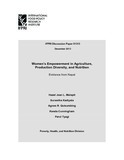| dc.contributor.author | Malapit, Hazel Jean L. | |
| dc.contributor.author | Kadiyala, Suneetha | |
| dc.contributor.author | Quisumbing, Agnes R. | |
| dc.contributor.author | Cunningham, Kenda | |
| dc.contributor.author | Tyagi, Parul | |
| dc.coverage.spatial | Nepal | en |
| dc.date.accessioned | 2016-08-12T15:31:56Z | |
| dc.date.available | 2016-08-12T15:31:56Z | |
| dc.date.issued | 2013-12 | |
| dc.identifier.citation | Malapit, H.J.L. et al., (2013) Women's Empowerment in Agriculture Production Diversity, and Nutrition: Evidence from Nepal, IFPRI Discussion Paper 01313. Washington D.C.: IFPRI | en |
| dc.identifier.uri | https://opendocs.ids.ac.uk/opendocs/handle/20.500.12413/12148 | |
| dc.description.abstract | It is increasingly recognised that agricultural growth and development do not necessarily translate into improved nutrition outcomes. Policymakers are increasingly grappling with how to design and implement agricultural policies and programmes that can also achieve nutritional objectives. Agriculture has direct links to nutrition in that it provides a source of food and nutrients and a broad-based source of income, as well as directly influencing food prices. Gender roles mediate these linkages, particularly in relation to increased food availability and increased income. Thus, one possible pathway through which agricultural development could improve health and nutrition outcomes is by considering gender roles and gender equity in agriculture. Using household survey data from Nepal, the author of this paper investigates the impact of women’s empowerment in agriculture and production diversity on dietary diversity and anthropometric outcomes of mothers and children. Production diversity is positively associated with mothers’ dietary diversity and body mass index. Production diversity is positively associated with dietary diversity for children under two and predicts weight-for-age (WAZ), weight-for-height (WHZ), and height-for-age (HAZ) z-scores of children over two years of age. Indicators of empowerment are significantly associated with maternal outcomes but have a variable effect on child outcomes. Women’s autonomy in production and hours worked improve maternal and children’s dietary diversity and child HAZ. | en |
| dc.description.sponsorship | UK Aid | en |
| dc.description.sponsorship | Department for International Development (DFID) | en |
| dc.language.iso | en | en |
| dc.publisher | International Food Policy Research Institute (IFPRI) | en |
| dc.relation.ispartofseries | IFPRI Discussion Paper;01313 | |
| dc.rights.uri | http://creativecommons.org/licenses/by-nc-nd/4.0/ | en |
| dc.subject | Agriculture | en |
| dc.subject | Economic Development | en |
| dc.subject | Gender | en |
| dc.subject | Nutrition | en |
| dc.subject | Sexuality and Development | en |
| dc.title | Women's Empowerment in Agriculture Production Diversity, and Nutrition: Evidence from Nepal | en |
| dc.type | Series paper (non-IDS) | en |
| dc.rights.holder | International Food Policy Research Institute (IFPRI) | en |
| dcterms.dateAccepted | 2013-12 | |
| rioxxterms.funder | Department for International Development, UK Government | |
| rioxxterms.identifier.project | LANSA | |
| rioxxterms.version | NA | en |
| rioxxterms.funder.project | 752f8189-3789-4438-be29-585edbe66660 | |


